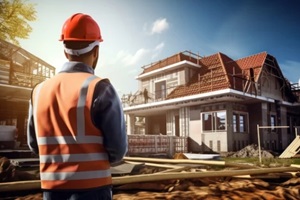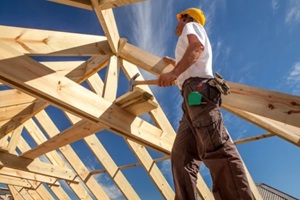
Home construction is fraught with risks from (and to) the workers themselves and unpredictable events such as natural disasters. Home builder insurance is a non-negotiable part of any construction team’s insurance coverage package. Understanding what home builder insurance should cover and what exclusions a team should be aware of is important to make the best decision about coverage.
Home builder insurance protects the builder and their project against unexpected damages that may result in additional expenses, such as property damage, delays, and unexpected expenses. These additional expenses could include material replacement, project timeline extension, etc.
Here’s a blueprint for home builder insurance basics, including what is standard and what may be excluded.
Understanding Home Builder Insurance
A home builder insurance policy, also called a builder’s risk policy, protects a residential construction project from physical damages and their resulting financial repercussions. This type of coverage is essential for home builders because it covers the main ways a project can go wrong without needing to secure multiple types of individualized protection.
However, home builder insurance is just one part of a comprehensive insurance strategy. Do not neglect other important securities, such as workers’ compensation and equipment insurance, in addition to your builder’s risk policy.
These should work together seamlessly, and collaborating with an industry professional can allow your team to leverage bundle deals and other incentives to achieve maximum coverage at a reasonable price point.
What Is Covered Under Home Builder Insurance?
Each home builder insurance policy is unique, so always read the fine print. Generally, a builder’s risk insurance policy will include two main prongs of protection: property damage and liability.
Property damage coverage addresses the many harms that may come to a building during construction. Before a structure can benefit from the protection of its outer shell, such as a roof and siding, it is especially prone to damage and destruction.
Home builder insurance can secure a new construction against many natural perils, such as hail, fire, wind, storms, and lightning. Depending on the risk profile of the construction area, some policies may also include security from earthquakes and hurricanes.
In addition to damage caused by nature, some types of human-made harm are also commonly covered. Vandalism, theft, and auto collisions that hit the building during its construction may also be included in the property damage components of home builder insurance.
On the liability side, builder’s risk insurance understands that construction sites are dangerous places. If a passerby trips over work equipment and injures themselves, or if a piece of construction material gets out of hand and damages a nearby car, a building team can benefit from liability coverage. This would pay for the third party’s medical bills or property damage costs to make them whole again.
Additional Coverage Options
At its baseline, home builder insurance should cover a blend of property and third-party damages. However, some policies may include additional features, or these elements can be added alongside a builder’s risk policy to increase protection.
Business interruption insurance can reduce the financial consequences if a construction project falls outside its expected timeline. For instance, if supply issues delay the project or a fire requires rebuilding a section of the home, business interruption insurance can help pay for the resulting increased costs.
Similarly, workers’ compensation insurance should be included in a finalized mixture of builder insurance. Workers’ comp can pay for their medical treatment, rehabilitation, and time off work to recover if a worker becomes injured on the job.
Common Exclusions in Home Builder Insurance

While home builder insurance is often fairly comprehensive, not all policies will include all potential perils. Many will exclude natural disasters or reduce their coverage amounts should such an act of God occur.
Intentional acts of negligence are rarely covered; if an employee sabotages a work site or workers misuse their equipment, resulting in property damage, insurance will likely not cover these instances. This is to prevent construction crews from committing insurance fraud by deliberately ruining their work for a payout.
Protect Your Construction Projects with Burton & Company
Construction projects are complex, with many moving parts—and amid the many decisions that need to be made, choosing insurance can seem to be a significant time commitment.
By working with industry experts such as Burton & Company, your team can secure home builder insurance coverage that addresses the unique risks of your specific project. Contact Burton & Company for tailored insurance solutions so you can focus on completing your construction with confidence, no matter what risks your project is facing.

